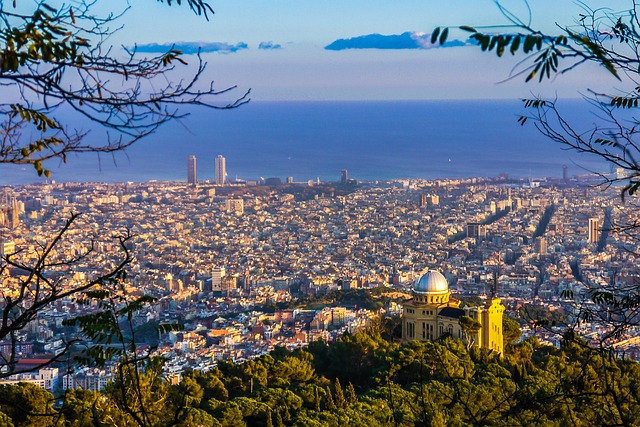Barcelona is set to implement a substantial increase in the tourism tax specifically targeting cruise passengers. This move is part of the city’s efforts to address the challenges posed by mass tourism.
The decision aims to balance tourism’s economic benefits with the need to preserve the city’s quality of life, ensuring that tourism revenue is reinvested into community projects.
Barcelona’s Strategy to Manage Tourism
Barcelona’s decision to increase the tourism tax is part of a broader strategy to manage the impact of mass tourism on the city. The Catalan capital, renowned for its rich culture and historical landmarks, is addressing challenges associated with the influx of tourists, particularly those from cruise ships. This policy adjustment aims to ensure sustainable tourism practices.
The current £6-a-day tax paid by cruise passengers is set to be increased, although the exact amount remains unspecified. This move is seen as necessary to balance the economic benefits of tourism with the preservation of the city’s quality of life. The city’s administration is keen on ensuring that the benefits of tourism are equitably distributed across local projects.
The Impact of Cruise Tourism in Barcelona
Cruise tourism contributes significantly to Barcelona’s economy, attracting over a thousand ships annually. However, the surge in cruise passengers has raised concerns about overcrowding and strain on local resources. Passengers who visit for less than 12 hours often contribute to the intensive use of public spaces without commensurate economic benefit to the city.
The local government, led by Mayor Jaume Collboni, is responding to these challenges by re-evaluating the current taxation system for cruise tourists. This adjustment is designed not to deter tourists but to promote a more balanced approach to tourism management.
Public Sentiment and Social Impact
There is growing public concern in Barcelona regarding the effects of mass tourism. Residents have voiced issues related to housing, pollution, and the overall quality of life, driven by the large volumes of tourists arriving daily.
Protests have become a common sight, with demonstrators highlighting the adverse effects of tourism on their daily lives. The decision to increase the tourist tax is partly a response to these public sentiments, aiming to mitigate the negative impacts and foster a respectful tourism culture.
This initiative aligns with measures in other European cities grappling with similar challenges, such as Amsterdam, which plans to relocate its cruise terminal. Barcelona’s efforts are reflective of a broader trend in addressing overtourism within major tourist destinations.
Funding Local Projects Through Tourism Revenue
The additional revenue generated from the increased tourism tax is expected to be reinvested into local infrastructure projects. Mayor Collboni has indicated plans to use these funds for community benefits such as installing air conditioning in schools, showcasing a direct link between tourism-generated revenue and community welfare.
This approach underscores a commitment to ensuring that tourism not only boosts the local economy but also enhances the living standards of residents. It’s a step towards achieving a harmonious balance between tourism growth and community well-being.
Comparative Measures in Other Cities
Barcelona is not alone in its efforts to manage tourism more sustainably. Other cities like Amsterdam are undertaking similar initiatives to mitigate the impacts of mass tourism by modifying their cruise ship policies.
These measures are indicative of a larger movement amongst popular tourist destinations to adopt policies that prioritise residents’ quality of life while maintaining economic benefits from tourism. Such strategies highlight the importance of sustainable tourism practices.
Barcelona’s policy changes are being closely watched as potential benchmarks for other cities facing overtourism. This sets a precedent for how major urban centres can balance tourism with local interests effectively.
Economic and Environmental Considerations
The economic implications of adjusting tourism taxes are complex. While the tourism industry is a vital part of Barcelona’s economy, it’s crucial that it doesn’t come at the expense of environmental sustainability and urban congestion.
By increasing the cruise passenger tax, Barcelona aims to alleviate some of the environmental pressures while still capitalising on the economic influx provided by tourism. This approach is designed to ensure that tourism development does not undermine environmental integrity.
The city’s plan reflects a growing awareness of the need to integrate economic and environmental policies for sustainable urban development. Such a balance is critical for maintaining both the economic vitality and quality of life in Barcelona.
Future Prospects for Barcelona’s Tourism
The tourism tax increase is anticipated to influence future tourism dynamics in Barcelona. This policy is part of a long-term vision to cultivate a tourism industry that aligns with the city’s values and priorities.
Barcelona’s approach to increasing the cruise ship tourism tax reflects a strategic effort to balance tourism growth with civic responsibility. The initiative is designed to foster a sustainable tourism environment.
By reinvesting tourism revenue into local projects, Barcelona aims to enhance community welfare while maintaining its status as a leading tourist destination.

